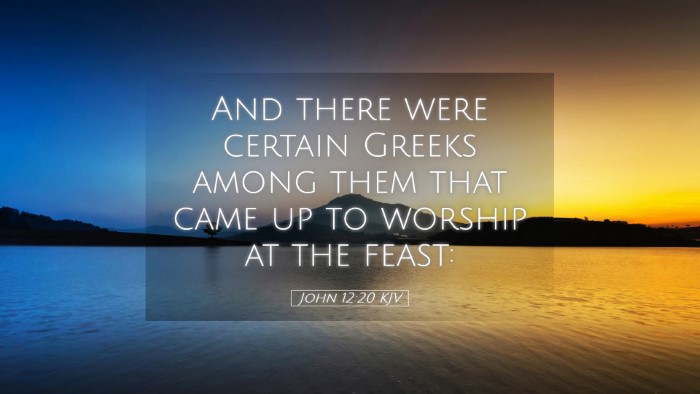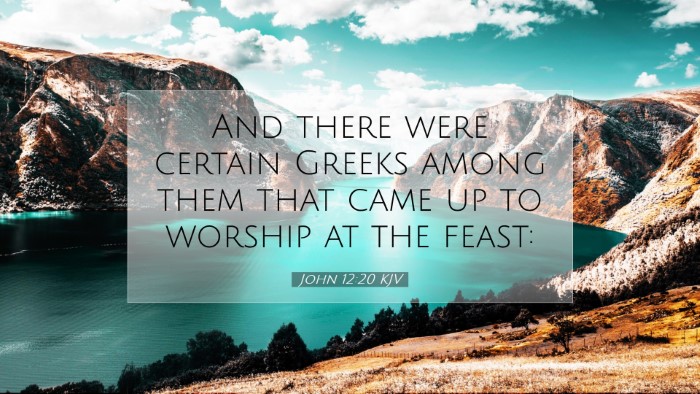Commentary on John 12:20
John 12:20 states:
"Now there were some Greeks among those who went up to worship at the festival."
This verse sets the stage for a profound revelation concerning the inclusiveness of the gospel and the universality of Christ’s mission. Several public domain commentators offer rich insights that enhance our understanding of this pivotal moment in the Gospel of John.
Overview and Context
The context of John 12 is set during the Passover festival in Jerusalem, where many Jews and proselytes gathered. The presence of Greeks, or Gentiles, seeking to worship is significant. According to Matthew Henry, this indicates the growing interest in Jesus as not only a Jewish Messiah but someone for all nations.
Theological Implications
Albert Barnes comments on the Greeks' arrival and the implications it carries for the ministry of Jesus. Their presence suggests that Jesus’ fame was spreading beyond the Jewish community, fulfilling the prophecy that "in Him shall the Gentiles trust" (Romans 15:12).
Furthermore, Adam Clarke notes that the term "Greeks" refers to Gentiles who were either converts to Judaism or were interested in Judaism. This reflects a divinely ordained plan of inclusivity, emphasizing that the worship of God is not confined to one ethnic group. The festival thus represents a turning point where the world begins to seek the true God as revealed in Christ.
Examining the Passover Festival
The Passover festival commemorates the Israelites’ deliverance from Egypt—a central theme in Jewish faith—and is significant in illustrating God's redemptive plan. Matthew Henry explains that this gathering resulted in heightened messianic expectations. As the Greeks approach the disciples to seek Jesus, it aligns with the larger scope of Jesus' ministry, which seeks the lost sheep from all nations.
The Greeks Seek Jesus
The desire of these Greeks to see Jesus is noteworthy. As Albert Barnes elaborates, their inquiry not only affirms Jesus' influence but also symbolizes a longing for truth and spiritual fulfillment. They represented those who had tasted the Jewish faith yet yearned for something deeper. It echoes the universal human quest for meaning, a theme prevalent throughout Scripture.
- Spiritual Thirst: The Greeks act as representatives of those who, though outside the covenant community, seek significance in the Messiah.
- Divine Recognition: Their pursuit signifies the recognition of Jesus as the answer to human longing, aligning with John 4:14, where Jesus promises "living water."
- Invitation to All: Their interest underlines the message that Jesus is approachable—His gospel is for everyone.
Jesus’ Response and the Broader Revelation
While John 12:20 does not explicitly detail Jesus' response, the following verses reveal a profound teaching moment. Jesus responds to the Greeks' request by speaking about his impending death (John 12:23-26), indicating that His glorification would transcend cultural and ethnic boundaries. Matthew Henry notes, “The grain of wheat must die to produce much fruit.”
Here, Jesus speaks about His sacrifice, which is both a reality of His mission and a foreshadowing of the expansion of His saving work beyond the Jewish people. Albert Barnes further emphasizes that the acknowledgment of the Greeks signals the dawning of a new era in God's redemptive history, where Jews and Gentiles are united in Christ.
Conclusion
In conclusion, John 12:20 opens a compelling narrative that invites a deeper understanding of Jesus' mission and the promise of salvation extended to all humanity. As we reflect on the significance of the Greeks seeking Jesus during the Passover, we are reminded of the transformative power of the Gospel that transcends ethnic, cultural, and social barriers.
The insights from public domain commentaries by Matthew Henry, Albert Barnes, and Adam Clarke urge us to embrace the universality of Christ’s message and the importance of reaching out to those who are spiritually hungry. As biblical scholars, pastors, and students, we are challenged to live out the implications of this verse by sharing the hope of the gospel with all nations.


